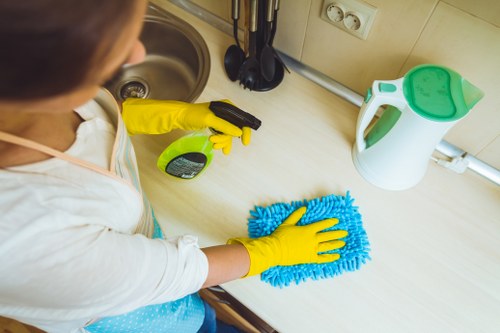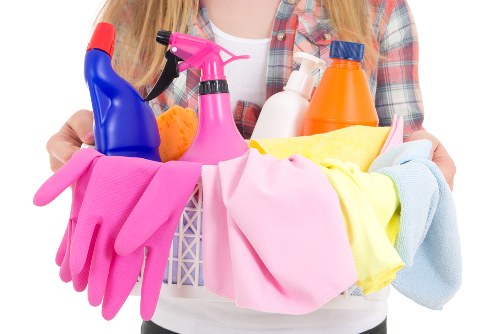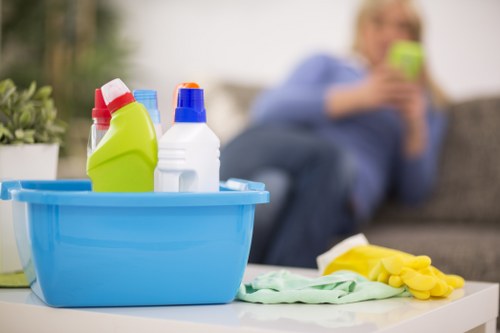Oven Cleaning in Harrow: Your Comprehensive Guide

Keeping your oven clean is essential not only for the longevity of the appliance but also for the quality of the food you prepare. In Harrow, residents have access to a variety of oven cleaning services that cater to different needs and budgets. Whether you prefer a professional service or a do-it-yourself approach, this guide will help you achieve a spotless oven.
Oven cleaning can seem like a daunting task, especially if you've neglected it for a while. Built-up grease and grime can affect the efficiency of your oven, making it work harder and consume more energy. Regular maintenance is key to preventing these issues.
Before diving into cleaning methods, it's important to understand the different types of ovens and their specific cleaning requirements. Whether you have a conventional oven, a self-cleaning oven, or a pyrolytic oven, each type has its own unique features and cleaning processes.
Why Regular Oven Cleaning Matters

Regular oven cleaning offers numerous benefits that go beyond just aesthetic appeal. A clean oven ensures that your food tastes better and is free from unwanted residues. It also reduces the risk of smoke and unpleasant odors that can permeate your kitchen.
From a health perspective, a dirty oven can harbor bacteria and other harmful microorganisms. This is especially concerning if you frequently bake or roast meats and other high-protein foods. Ensuring your oven is clean promotes a healthier cooking environment.
Moreover, a well-maintained oven operates more efficiently. Reducing the build-up of grease and food particles means your oven doesn't have to work as hard, potentially lowering your energy bills and prolonging the lifespan of the appliance.
Professional Oven Cleaning Services in Harrow

For those who prefer not to tackle oven cleaning themselves, Harrow boasts a number of professional services that can take care of the task swiftly and effectively. Professional cleaners use specialized products and techniques to ensure a deep clean without damaging your oven.
When choosing a professional service, consider factors such as reputation, pricing, and the specific services offered. Many companies provide additional services like kitchen deep cleaning, which can be a valuable addition if you're looking for a comprehensive cleaning solution.
Additionally, professional oven cleaners often offer flexible scheduling options to accommodate your busy lifestyle. Whether you need a one-time deep clean or regular maintenance, there's likely a service in Harrow that fits your needs.
Benefits of Hiring Professionals

Hiring professionals for oven cleaning comes with several advantages. They possess the expertise to handle different types of ovens and know the best cleaning agents to use. This minimizes the risk of damage and ensures a thorough clean.
Moreover, professionals can save you time and effort, allowing you to focus on other important tasks. Their efficiency means your oven will be clean in a fraction of the time it would take you to do it yourself.
Finally, professional services often come with guarantees. If you're not satisfied with the results, many companies will redo the job at no additional cost, providing peace of mind and ensuring satisfaction.
DIY Oven Cleaning Methods

If you prefer to clean your oven yourself, there are several effective methods you can try. DIY cleaning not only saves money but also allows you to control the cleaning process and use eco-friendly products.
One popular method involves using baking soda and vinegar. Baking soda acts as a natural abrasive that helps lift grime, while vinegar dissolves grease. This combination is both effective and safe for most oven types.
Another method is using commercial oven cleaners, which are designed to tackle tough stains and baked-on food. However, it's important to follow the manufacturer's instructions carefully to avoid any damage to your oven.
Baking Soda and Vinegar Method
To use the baking soda and vinegar method, start by removing any loose debris from the oven. Mix baking soda with water to form a paste and apply it to the interior surfaces of the oven, avoiding heating elements. Let it sit overnight to break down the grime.
The next day, spray vinegar over the baking soda paste. The reaction between the two creates a foaming action that helps loosen stubborn stains. Wipe down the oven with a damp cloth, and you'll be left with a cleaner oven with minimal effort.
This method is not only effective but also environmentally friendly, making it a great choice for those looking to reduce their use of harsh chemicals.
Essential Tips for Maintaining a Clean Oven
Maintaining a clean oven doesn't have to be difficult. By following a few simple tips, you can keep your oven in top condition with minimal effort.
- Wipe up spills immediately after each use to prevent them from baking onto the surfaces.
- Use oven liners or baking sheets to catch drips and crumbs.
- Avoid using excessive amounts of oil or fat, which can contribute to build-up.
- Regularly check and clean the oven racks to prevent grime from accumulating.
- Run the self-cleaning cycle if your oven has one, following the manufacturer's guidelines.
Implementing these practices can significantly reduce the frequency and intensity of required oven cleanings, making the process more manageable over time.
Additionally, keeping the exterior of your oven clean helps maintain its appearance and prevents the spread of grease and food particles to surrounding surfaces.
Choosing the Right Cleaning Products
Selecting the right cleaning products is crucial for effective oven maintenance. When opting for commercial cleaners, ensure they are suitable for your oven type and follow the instructions meticulously.
For those who prefer natural cleaning solutions, products like baking soda, vinegar, and lemon juice can be highly effective. These options are safer for the environment and reduce exposure to harsh chemicals.
Always ventilate your kitchen well when using cleaning products to avoid inhaling fumes. Additionally, wearing gloves can protect your skin from irritation caused by cleaning agents.
Local Oven Cleaning Services in Surrounding Areas
Harrow residents have access to a range of oven cleaning services not just within Harrow, but also in nearby areas. These services ensure that professional help is always within reach, no matter where you are.
Some of the closest areas include:
- North Harrow
- East Harrow
- West Harrow
- South Harrow
- Pinner
- Wealdstone
- Rayners Lane
- Canons Park
- Sudbury
- Alperton
- Eastcote
- Hassocks
- West End
- Stanmore
- Canons Park
Each of these areas has its own unique features and local businesses that specialize in oven cleaning. Whether you're in the heart of Harrow or in one of the surrounding neighborhoods, finding a reliable oven cleaning service is easy and convenient.
Proximity to these areas ensures that services can be provided swiftly, reducing wait times and offering flexible scheduling to meet your needs.
Energy Efficiency and Your Oven
Maintaining a clean oven isn't just about aesthetics or hygiene; it also plays a significant role in energy efficiency. A clean oven requires less energy to operate, which can lead to noticeable savings on your energy bills over time.
When grease and grime build up, they can insulate surfaces and make the oven work harder to maintain the desired temperature. This inefficiency not only consumes more energy but also shortens the lifespan of the appliance.
By keeping your oven clean, you ensure that it operates at peak efficiency. This not only benefits your wallet but also contributes to a more sustainable household by reducing energy consumption.
Signs Your Oven Needs Cleaning
Recognizing when your oven needs cleaning can prevent minor issues from becoming major problems. Here are some signs to look out for:
- Visible buildup of grease and food particles
- Unpleasant odors when the oven is in use
- Excessive smoke during cooking
- Longer cooking times than usual
- Inconsistent heating and temperature control
If you notice any of these signs, it's time to give your oven some attention. Addressing these issues early can save you time and money in the long run.
Regular inspections and cleaning can help maintain your oven's performance and prevent the accumulation of harmful debris.
Common Oven Cleaning Mistakes to Avoid
While cleaning your oven, it's important to avoid certain mistakes that can cause more harm than good. Here are some common errors to steer clear of:
- Using abrasive tools that can scratch and damage the oven's surfaces.
- Mixing different cleaning products, which can create dangerous fumes.
- Neglecting to unplug the oven before cleaning, posing a safety risk.
- Ignoring manufacturer guidelines, which can void warranties and lead to appliance damage.
- Using too much water, which can seep into electrical components and cause malfunctions.
By being aware of these potential pitfalls, you can ensure a safe and effective cleaning process. Taking the time to clean properly can extend the life of your oven and maintain its optimal performance.
Always refer to your oven's user manual for specific cleaning instructions and recommendations tailored to your appliance.
Safety Precautions During Cleaning
Oven cleaning involves the use of various chemicals and tools, making safety a top priority. Here are some safety precautions to keep in mind:
- Always wear protective gloves to prevent skin irritation from cleaning agents.
- Ensure proper ventilation by opening windows or using fans to disperse fumes.
- Turn off and unplug the oven before starting any cleaning procedures.
- Use non-abrasive cleaning tools to avoid damaging the oven’s surfaces.
- Store cleaning products safely out of reach of children and pets.
Adhering to these safety measures helps prevent accidents and ensures a smooth and effective cleaning experience.
Additionally, keep a first aid kit nearby when using strong chemicals, just in case of accidental exposure.
Eco-Friendly Oven Cleaning Options
For environmentally conscious individuals, eco-friendly oven cleaning options are available. These methods use natural ingredients that are safe for both your oven and the planet.
Baking soda and vinegar, as previously mentioned, are excellent eco-friendly cleaning agents. They are non-toxic, biodegradable, and highly effective at removing grease and grime without leaving harmful residues.
Lemon juice is another natural cleaner that can be used to cut through grease and impart a fresh scent to your oven. Its acidic properties help break down stubborn stains, making it a versatile addition to your cleaning routine.
Homemade Cleaning Solutions
Creating your own cleaning solutions is a great way to reduce your environmental footprint. Here are a few recipes you can try:
- Baking Soda Paste: Mix 1/2 cup of baking soda with a few tablespoons of water to create a thick paste. Apply to the oven surfaces and let it sit overnight before wiping clean with a damp cloth.
- Lemon Vinegar Spray: Combine equal parts lemon juice and white vinegar in a spray bottle. Spray the mixture onto oven surfaces and let it sit for 15 minutes before wiping away with a sponge.
- Salt and Baking Soda Scrub: Mix 1/4 cup of salt with 1/4 cup of baking soda and enough water to form a gritty paste. Use it to scrub away stubborn stains and residue.
These homemade solutions are not only effective but also cost-efficient, making them a smart choice for regular oven maintenance.
By opting for natural cleaning methods, you contribute to a healthier home environment and support sustainable living practices.
Choosing Between Self-Cleaning and Manual Cleaning
Modern ovens often come with self-cleaning features that can simplify the cleaning process. Understanding the differences between self-cleaning and manual cleaning methods can help you decide which approach is best for your needs.
Self-cleaning ovens use high temperatures to burn off food residues, turning them into ash that can be easily wiped away. This method is convenient and requires minimal effort, but it can consume more energy and may produce unpleasant odors during the cleaning cycle.
Manual cleaning, on the other hand, allows for more control over the cleaning process. While it may require more time and effort, manual methods can be more thorough and use fewer chemicals, making them a preferable option for those seeking an eco-friendly solution.
Pros and Cons of Self-Cleaning Ovens
Self-cleaning ovens offer several advantages, such as convenience and the ability to reach high temperatures that can dissolve tough grime. However, there are also some drawbacks to consider.
- Pros: Easy to use, effective at breaking down tough stains, minimal physical effort required.
- Cons: High energy consumption, potential for unpleasant odors, not suitable for all types of ovens.
Weighing these pros and cons can help you determine whether a self-cleaning oven is the right choice for your household.
Ultimately, the decision depends on your personal preferences, lifestyle, and the specific requirements of your oven.
Maintaining Your Oven's Performance
Regular cleaning is just one aspect of maintaining your oven’s performance. Proper usage and routine maintenance can further enhance efficiency and extend the life of your appliance.
Always use cookware that distributes heat evenly to prevent hotspots and reduce the likelihood of spills and splatters. Additionally, avoid slamming oven doors, as this can damage the seals and impact insulation.
Periodic inspections of heating elements and door seals are also recommended. Identifying and addressing minor issues early can prevent more significant problems down the line.
Routine Maintenance Tasks
Incorporating routine maintenance tasks into your cleaning schedule can ensure your oven remains in optimal condition:
- Check and replace oven seals as needed to maintain heat efficiency.
- Inspect heating elements for signs of wear or damage and replace if necessary.
- Clean oven racks regularly to prevent build-up and maintain appearance.
- Calibrate the oven’s temperature settings periodically to ensure accurate cooking results.
- Ensure that the oven door closes properly to retain heat and prevent energy loss.
These maintenance tasks can help keep your oven functioning efficiently and reduce the need for extensive cleanings in the future.
By staying proactive with maintenance, you can enjoy consistent cooking performance and avoid unexpected breakdowns.
Choosing the Right Oven Cleaner
Selecting the appropriate oven cleaner is essential for effective and safe cleaning. Different cleaners are formulated for various purposes, so it's important to choose one that matches your cleaning needs.
Here are some factors to consider when selecting an oven cleaner:
- Type of Oven: Ensure the cleaner is suitable for your specific oven type, whether it’s conventional, self-cleaning, or pyrolytic.
- Cleaning Strength: Choose a cleaner based on the level of grime and build-up in your oven. Heavier-duty cleaners are needed for more stubborn stains.
- Chemical Composition: Opt for cleaners with safer, eco-friendly ingredients if you prefer to minimize chemical exposure in your home.
- Ease of Use: Consider how easy the cleaner is to apply and remove. Some products may require additional steps, such as rinsing or scrubbing.
- Manufacturer Recommendations: Always check the oven manufacturer’s guidelines to ensure compatibility with their appliance.
By carefully evaluating these factors, you can select a cleaner that effectively meets your needs while maintaining the integrity of your oven.
Additionally, reading reviews and seeking recommendations can help you make an informed decision when choosing the best oven cleaner for your home.
Cost of Oven Cleaning Services in Harrow
The cost of professional oven cleaning services in Harrow varies based on several factors, including the size of your oven, the level of grime, and the specific services requested. On average, prices range from £50 to £150.
Basic cleaning services typically fall at the lower end of the price spectrum, while deep cleaning or additional services like kitchen maintenance can increase the cost. It's important to obtain quotes from multiple providers to compare prices and ensure you're getting good value for your money.
Many service providers offer package deals or discounts for recurring cleanings, which can help reduce overall costs. Investing in regular professional cleanings can also extend the lifespan of your oven, providing long-term savings.
Cost Comparison: Professional vs. DIY
While professional oven cleaning services come at a cost, they offer several benefits that DIY methods might not provide. Professional cleaners have access to specialized tools and products that ensure a thorough clean without damaging your oven.
In contrast, DIY cleaning requires purchasing cleaning agents and tools, which can add up over time. Additionally, the time and effort involved in manual cleaning can be considerable, especially for those with busy schedules.
Ultimately, the decision between professional and DIY cleaning depends on your budget, time constraints, and personal preferences. Both approaches can result in a clean oven, but each has its own set of advantages and considerations.
Choosing a Reliable Oven Cleaning Service
With numerous oven cleaning services available in Harrow and its surrounding areas, selecting a reliable provider is crucial. Here are some tips to help you choose the right service:
- Check Reviews and Testimonials: Look for customer feedback to gauge the quality of service and customer satisfaction.
- Verify Credentials: Ensure the company is properly licensed, insured, and follows industry standards.
- Ask About Cleaning Methods: Inquire about the products and techniques used to ensure they align with your preferences and needs.
- Compare Quotes: Obtain multiple quotes to compare pricing and services offered, ensuring you receive fair value.
- Evaluate Customer Service: A company that communicates effectively and addresses your concerns is likely to provide a better overall experience.
Taking the time to research and evaluate different services can help you find a trustworthy and efficient oven cleaning provider that meets your requirements.
Remember, a clean oven is an investment in your kitchen’s functionality and your family's health, so choose wisely.
Conclusion
Maintaining a clean oven is essential for efficient cooking, energy savings, and a healthier kitchen environment. In Harrow, you have access to a range of professional and DIY oven cleaning options that cater to different needs and preferences.
Whether you choose to hire a professional service or undertake the task yourself, regular cleaning and maintenance will keep your oven in excellent condition and enhance its performance.
By following the tips and methods outlined in this guide, you can achieve a spotless oven that not only looks great but also operates efficiently, ensuring delicious meals for years to come.
Frequently Asked Questions
1. How often should I clean my oven?
It's recommended to clean your oven at least every three months, depending on usage. If you cook frequently or notice a lot of spills, more frequent cleaning may be necessary.
2. Can I use bleach to clean my oven?
No, bleach is not recommended for oven cleaning as it can damage the appliance and leave harmful residues. Opt for baking soda, vinegar, or commercially available oven cleaners instead.
3. Is it safe to use self-cleaning on my oven?
Yes, most modern ovens are designed with self-cleaning functions that are safe to use. However, always follow the manufacturer's instructions and ensure proper ventilation during the process.
4. What should I do if my oven has stubborn stains?
For stubborn stains, a combination of baking soda and vinegar can be effective. Apply the paste, let it sit overnight, and then spray with vinegar before wiping clean. For extremely tough stains, professional cleaning services may be necessary.
5. Can regular cleaning extend the life of my oven?
Absolutely. Regular cleaning prevents the build-up of grime and grease, which can affect the oven's functionality and efficiency. Maintaining a clean oven helps prolong its lifespan and ensures it operates optimally.

